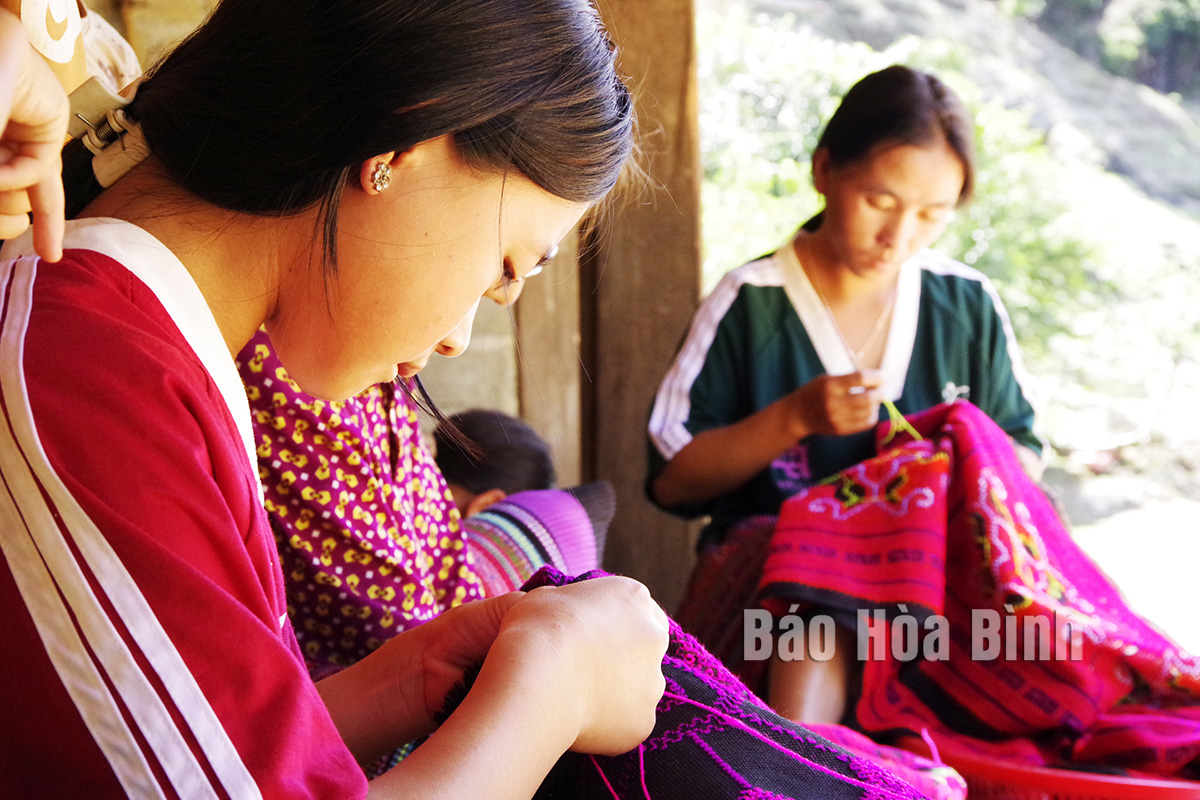After being instructed by her grandmother and mother, Ho Y Du in Hang Kia hamlet, Hang Kia commune in Mai Chau district could embroider difficult and elaborate patterns on her first brocade dress that she made herself. According to the customs of the H’Mong ethnic group in the district, any girl must make a beautiful brocade dress for herself when she turns 10 to mark her maturity as well as to demonstrate the ingenuity and diligence of H’Mong girls.
Ho Y Du in Hang Kia hamlet, Hang
Kia commune, Mai Chau district makes a brocade dress by herself.
Sung A Lu, an elder in Thung Mai hamlet said that the tradition
has been passed down from generation to generation. Today, thanks to better
economic conditions, the H'Mong people can buy ready-made dresses, they still
preserve and promote this tradition.
For them, every girl must know how to embroider at least one
traditional costume for themselves. In addition to cultural preservation, the H’Mong people in Hang Kia and Pa Co
communes have turned cultural values into attractive tourism products which
create a driving force for local socio-economic development.
For example, Sung Y Mua's family in Hang Kia commune has offered homestay
service since 2012. Seeing that visitors are interested in learning about local
culture, Mua thought of opening a H’Mong culture space where visitors can
experience daily activities of the ethnic group such as embroidering, beeswax
painting, farming, fabric dyeing, and "do" paper making.
To realise that idea, earlier this year, she started building an
H’Mong ethnic cultural conservation house. More than 200 artifacts are displayed at the house that covers
an area of 2,000 sq.m in the heart of plum and peach gardens.
Mua also arranged spaces dedicated to the traditional
occupations of the H’Mong people such as blacksmith, linen weaving, paper
making, or corn wine making. The house also displays valuable antiques of the H’Mong people
such as elaborately woven scarves, ancient skirts and household items dating
back hundreds of years.
Ngan Van Tuan, head of the Division of Culture and Information
of Mai Chau district, said that the district is home to seven minority ethnic
groups with diversified cultural values. In recent years, the district has tapped the potential of
natural landscapes and unique culture to attract tourists, gradually turning
tourism into a key economic sector.
Local authorities have have paid special attention to preserving and promoting
traditional cultural values of the ethnic groups. Notably, in 2020, the
district Party Committee issued Resolution No. 15-NQ/HU on preserving the
cultural identity of ethnic groups in the locality in the 2020-2025 period,
with a vision to 2030. Every year, it organises traditional festivals.
Recently, it has successfully re-enacted the Xen Muong festival of the Thai
ethnic group.
Tuan said that Party
committees and authorities of communes and towns have focused on preserving
tangible and intangible cultural values, especially their traditional costumes,
folk songs, folk dances, weaving looms, and traditional stilt houses. The cultural values have helped the province to attract many visitors.



